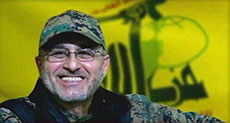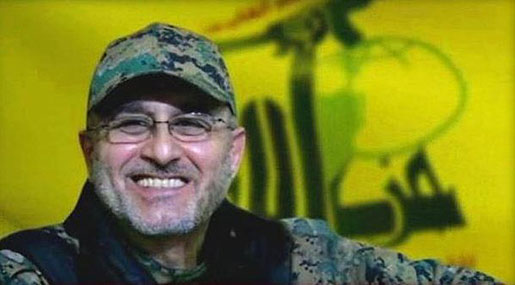
Suleimani in ’Zulfikar’s’ House... Expressing Condolences

Hadi Ahmad
Two days after the "Israeli" attack on Quneitra [Syria] in January 2015, the commander of the Iranian Revolutionary Guards, Quds Force, Brigadier General Qassem Suleimani, visited Rawdat Al-Shahidain Cemetery in Ghoubeiry. A picture of him, reading verses from the Quran over the tombs of martyr Imad Mughniyeh and his son Jihad, began to circulate.

Before getting there, Suleimani headed to the family house of martyr Jihad and expressed his condolences to the martyr's relatives, including his uncle Mustafa Badr Al-Din.
Last Saturday night, that scene was replayed. Suleimani once again headed to Ghoubeiry. But this time, he came to pay his respects to Badr Al-Din's family for his martyrdom.
It is not the first time that he enters the "House of Sorrows", where another picture was added to those of the martyrs there. The family friend sits among the family members and recites the Quranic verse (And never think of those who have been killed in the cause of Allah as dead. Rather, they are alive with their Lord, receiving provision.), before he begins to speak - holding a rosary made of dirt with his right hand while his left hand is adorned with an onyx ring. Addressing the martyr's mother, Mrs. Um Adnan, Suleimani said: "We have lost a leader and a dear brother. This loss is the loss of the Islamic nation. The loss of a figure like Sayyed Zulfikar cannot be defined to a country, area, or suburb."
He added: "it is not new to a family of mujahedeen that offered Hajj Radwan and a young man like Jihad, to offer more martyrs"
Zulfikar used to always evoke the memories of Imad and Jihad. He always remembered them. But according to people close to him, talk about both martyrs became more frequent in the past few days. The time had neared, and evoking their memories is further proof of that.
In the forty years of giving and jihad, Sayyed Zulfikar talked about seeking martyrdom, confirming that it was his ultimate goal. His wish has come true, and that was what he has been waiting for since the inception of the Resistance. "We were confident that a leader like Zulfikar has been seeking martyrdom since the prime of his youth and since he started working with the resistance. Therefore, it is not surprising that his life ends with martyrdom and not on the death bed," Suleimani confirmed. Then he whispers to Ali, the martyr's son who was overwhelmed with sadness and abandonment: "you will be on your father's path, a role model - like him - for your generation and for all the young people."
He sat for a third of an hour and then headed to Rawdat Al-Shahidain Cemetery. He started with tombs of the martyr Imad and Sayyed Zulfikar. He knelt and muttered Quranic verses. Then he passed by the tombs of other martyrs greeting; he read the names and asked about some of them. While walking quietly among them, he evoked the memory of Commander Ali Fayyad "Alaa Bosnia" who was martyred on the Khanasser road-Aleppo in February of this year.
He asked about his tomb. He was told that Ali Fayyad was buried in his hometown of Ansar. He greeted the martyrs' families who were present. Coincidently he met a wounded man from the resistance who was visiting his friends. The incident drew a kind smile on his face.
Suleimani was surprised to learn how Sayyed Zulfikar would stay away from his family for two or three months at a time since the start of the conflict in Syria, only to return after a few days, to compensate for lost time.
Those who knew Badr Al-Din confirm that he made sure not to miss a family occasion and give them gifts. His family obligations came above all else, even security matters. During his daughter's wedding in 2012, he insisted after the celebration to head to the hall and take photos with the bride and the family. "Kinship" was "sacred" to him. Without taking into account the security issues, he kept visiting his sick brother - after he was diagnosed with cancer in 2007- every week for two years until his death.
One of his concerns was for the family to gather and break their fast during the Month of Ramadan. He also followed news about everyone around him, from the young to the old. He would advise those going to the universities which courses they should study. He would guide them for a specific reason: "If you cannot serve the resistance militarily, serve the resistance community with a specialty that would benefit them."
On the artistic level, he loved old resistance songs. He did not approach the new ones with its diversity. He watched "Hollywood" movies where he would pay attention to the photography and plot. In Lebanon, he provided the supervisors of the "Al-Ghaliboun" series with a team form Hizbullah's Special Forces to assist in the desired military scenes. According to him the scenes needed to be played by those who mastered them.
The family was waiting with hope for his arrival once again, to see his face. But for the last time, it was best for him to hide his face from those who were missing him.
No slumber here in this house, just awareness after awareness. The family members here are used to martyrdom, and the same question keeps repeating endlessly "O Lord are you satisfied?" The same answer follows: "take until you are satisfied."
The house once again seems to be inhabited by memories. After 55 years, two digits and a comma cannot sum up his age. No pictures can be erased and no place where achievements were engraved can disappear. Since the inception of the resistance until his final day, time did not take away any of his features. And now he has come out into the light, as will some of his achievements someday. Whatever was revealed, the concealed will remain the greatest secret.
Source: al-Akhbar, Translated and Edited by website team
Comments



